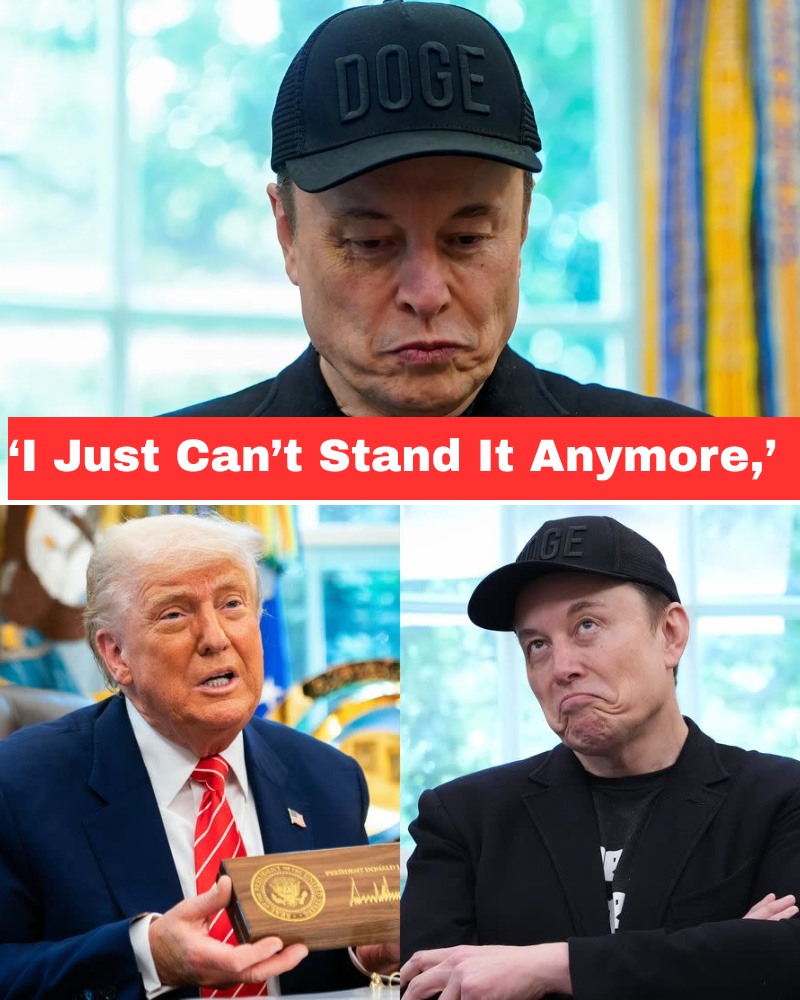
On June 3, 2025, Elon Musk, the billionaire tech mogul and former advisor to President Donald Trump, unleashed a scathing critique of Trump’s signature legislative proposal, the “One Big Beautiful Bill Act,” labeling it a “disgusting abomination.” In a series of posts on his social media platform X, Musk expressed his frustration, stating, “I’m sorry, but I just can’t stand it anymore. This massive, outrageous, pork-filled Congressional spending bill is a disgusting abomination. Shame on those who voted for it: you know you did wrong. You know it.” This outburst, coming just days after Musk’s departure from the Trump administration on May 29, 2025, marks a significant escalation in the unraveling of their once-close alliance. As of June 4, 2025, the controversy surrounding Musk’s comments continues to ripple through Washington, exposing deep ideological divides, testing Musk’s political influence, and raising questions about the future of Trump’s domestic agenda.
The Context: A Fractured Alliance
Musk’s relationship with Trump had been a cornerstone of the president’s second term, which began in January 2025. Musk, the CEO of Tesla, SpaceX, and xAI, emerged as Trump’s top political donor during the 2024 election, contributing nearly $300 million to his campaign against Kamala Harris. In return, Trump appointed Musk to lead the Department of Government Efficiency (DOGE), a taskforce aimed at slashing federal spending and rooting out inefficiency. Musk’s role in DOGE made him a hyper-visible figure in the administration, often seen alongside Trump at events like the SpaceX Starship launch in Texas and in the Oval Office, where he was dubbed the president’s “first buddy.” The two men initially projected a united front, with Musk praising Trump’s leadership on X and Trump lauding Musk’s business acumen.
However, their partnership was always fraught with underlying tensions. Musk, a tech innovator with a globalist outlook, often clashed with Trump’s protectionist and populist policies. Trump’s tariffs on China, announced in April 2025, threatened Tesla’s operations in Shanghai, while the administration’s $500 billion AI initiative, Stargate, partnered with Musk’s rival Sam Altman of OpenAI, further straining their relationship. Musk’s public criticism of these policies, including his advocacy for free trade and lower tariffs, signaled a growing rift. By the time Musk left DOGE, his favorability ratings had plummeted to a net -13 points, according to a Marquette poll in April 2025, reflecting public discontent with his aggressive cost-cutting measures, which some estimate contributed to significant global harm, including hundreds of thousands of deaths due to cuts in foreign aid.
The Bill: A Deficit-Ballooning Behemoth
The “One Big Beautiful Bill Act,” passed by the House in May 2025, is a sprawling piece of legislation that encapsulates Trump’s domestic priorities. It extends the 2017 tax cuts, eliminates taxes on tips and overtime work, boosts funding for immigration enforcement and the military, and raises the debt ceiling by $4 trillion. However, the bill also includes significant cuts to social programs like Medicaid and the Supplemental Nutrition Assistance Program (SNAP), as well as the rollback of electric vehicle (EV) tax credits—a move that directly impacts Musk’s Tesla, which has benefited from federal subsidies offering consumers up to $7,500 off certain EVs manufactured in the U.S.
The nonpartisan Congressional Budget Office (CBO) projects that the bill will add between $2.3 trillion and $5 trillion to the national debt over the next decade, a figure Musk cited in his X posts, warning that it would “massively increase the already gigantic budget deficit to $2.5 trillion (!!!) and burden American citizens with crushingly unsustainable debt.” Musk’s frustration with the bill is not new—he had previously expressed disappointment in a CBS Sunday Morning interview, stating that it “increases the budget deficit, not just decreases it, and undermines the work that the DOGE team is doing.” However, his latest remarks, calling the bill a “disgusting abomination,” represent a sharp escalation in tone, reflecting his exasperation with a legislative package he views as antithetical to his fiscal conservatism.
Musk’s Outburst: Motivations and Implications
Musk’s decision to publicly denounce the bill so forcefully, just days after his White House send-off, caught many by surprise. White House officials admitted they were unprepared for the intensity of his remarks, despite knowing his reservations about the bill. Musk’s motivations appear multifaceted. On one hand, his criticism aligns with his long-standing concern about the national debt, which he has described as an existential threat to the U.S. economy. As head of DOGE, Musk aimed to cut $2 trillion in federal spending, though he achieved only a fraction of that goal—estimated at $175 billion—before his departure. The bill’s deficit-increasing provisions directly undermine these efforts, a fact Musk highlighted in his X posts, stating, “Congress is making America bankrupt.”
On the other hand, Musk’s opposition may also be driven by personal and business interests. The elimination of EV tax credits in the bill poses a direct threat to Tesla’s market competitiveness, a concern House Speaker Mike Johnson acknowledged, noting that the rollback “has an effect on his business.” Additionally, Musk’s failed push to extend his special government employee status beyond the 130-day limit, as well as the withdrawal of his ally Jared Isaacman’s nomination to lead NASA, may have fueled his frustration with the administration. These setbacks, combined with the public backlash to his DOGE tenure, likely contributed to Musk’s decision to speak out, using his platform on X to rally opposition to the bill and even threatening to support efforts to unseat its supporters in the 2026 midterms, stating, “In November next year, we fire all politicians who betrayed the American people.”
Political Reactions: A Divided Response
Musk’s comments have reverberated across the political spectrum, emboldening fiscal conservatives while drawing sharp rebukes from Trump loyalists. Republican deficit hawks like Senators Rand Paul and Mike Lee of Kentucky and Utah, respectively, quickly endorsed Musk’s stance. Paul, who has opposed the bill’s $4 trillion debt ceiling increase, wrote on X, “I agree with Elon. We have both seen the massive waste in government spending and we know another $5 trillion in debt is a huge mistake. We can and must do better.” Lee echoed this sentiment, replying to Musk’s post, “The Senate must make this bill better.” In the House, Representative Thomas Massie, one of the few Republicans to vote against the bill, also supported Musk, stating, “He’s right.”
Conversely, Trump and his allies have pushed back hard. The president, who has been pressuring GOP senators to pass the bill by July 4, 2025, lashed out at Paul on Truth Social, calling him a “loser” with “crazy ideas” and claiming that “the people of Kentucky can’t stand him.” House Speaker Mike Johnson, who shepherded the bill through the House, expressed disappointment, telling reporters, “With all due respect, my friend Elon is terribly wrong about the One Big Beautiful Bill.” Johnson, who had spoken with Musk for 20 minutes the day before his outburst, suggested that Musk’s criticism stemmed from the EV tax credit rollback, but argued that the bill’s economic benefits—projected by Trump to spur 5-9% annual growth—outweighed such concerns. Senate Majority Leader John Thune dismissed Musk’s opposition as a “difference of opinion,” vowing to “proceed at full speed” to pass a revised version of the bill.
White House Press Secretary Karoline Leavitt, addressing Musk’s comments during a briefing on June 3, 2025, stated, “The president already knows where Elon Musk stood on this bill. It doesn’t change the president’s opinion. This is one big, beautiful bill, and he’s sticking to it.” Democrats, meanwhile, seized on Musk’s criticism to bolster their opposition. Senate Minority Leader Chuck Schumer and House Minority Leader Hakeem Jeffries both highlighted Musk’s remarks, with Jeffries stating, “Breaking news: Elon Musk and I agree with each other. The GOP tax scam is a disgusting abomination.”
A Critical Perspective: Beyond the Headlines
While Musk’s outburst has been framed as a personal betrayal of Trump, a deeper analysis reveals systemic issues at play. The “One Big Beautiful Bill Act” exemplifies the challenges of balancing campaign promises with fiscal responsibility. Trump’s focus on tax cuts and military spending aligns with his populist base, but the bill’s massive debt increase contradicts the GOP’s historical stance on fiscal conservatism—a contradiction Musk, Paul, and others have latched onto. However, Musk’s critique is not without its own contradictions. His tenure at DOGE, while aimed at cutting waste, was marred by allegations of conflicts of interest, as his cuts often benefited his companies like SpaceX, which secured FAA contracts, while harming vulnerable populations through reductions in social programs.
Moreover, Musk’s sudden vocal opposition may reflect a strategic pivot. Having left the administration, he is no longer bound by the same constraints and can now position himself as a fiscal watchdog, potentially rebuilding his public image after the backlash to his DOGE role. His threat to back challengers in 2026 suggests a long-term play to maintain political influence, leveraging his wealth and control over X to shape the Republican Party’s future. For Trump, Musk’s criticism poses a challenge but not an insurmountable one—his base remains loyal, and the bill’s passage in the Senate, though uncertain, is still within reach given the GOP’s 53-47 majority.
The Bigger Picture: A Test of Influence
Musk’s declaration, “I just can’t stand it anymore,” and his labeling of Trump’s bill as “disgusting” encapsulate the broader tensions between individual influence and political power in 2025. The fallout tests Musk’s ability to sway policy from outside the administration, while for Trump, it underscores the fragility of alliances built on mutual convenience rather than shared ideology. As the Senate debates the bill, with a target passage date of July 4, 2025, the clash between Musk and Trump serves as a microcosm of the larger struggle over America’s fiscal future—a struggle that will likely define the political landscape in the years to come.


